At the end of June, after 18 years as Ľ∆…ę÷Ī≤•‚Äôs president and vice-chancellor, Tom Traves is set to retire. He‚Äôs departing a very different Ľ∆…ę÷Ī≤• than the one he found in 1995: more campuses, more students, more programs, more research. It was a period of remarkable growth, and certainly not without its hurdles. In early May, Dr. Traves sat down with Dal News for an in-depth interview about his time as president ‚ÄĒ the opportunities, the challenges and the possibilities for the future.
, we asked Dr. Traves about how Dal has changed over the past 18 years, how the role of president has evolved, the expansion of the Dal community and the role of campus development in the Dal story. Now, in our conclusion, Dr. Traves discusses Dal's student experience, the university's research profile, his greatest challenges and accomplishments, and what he plans on doing after retiring as president.
Read also:
A growing Ľ∆…ę÷Ī≤•
Your presidency saw the arrival of a digital generation of students with growing expectations for universities ‚ÄĒ a generation that is the most national and international in Dal‚Äôs history. How did you work to balance meeting those students‚Äô needs while delivering on the core academic experience?
It’s one thing to deliver a kind of hands-on, comparatively intimate relationship on campus when you have 10,000 students; it’s a different story when you have 18,000. You need to be mindful that as the numbers change, so does the character of the institution.
Ľ∆…ę÷Ī≤• needed to grow for financial reasons; it‚Äôs that simple. If we didn‚Äôt grow, we were going to have to close many programs and the ones we had would have been stuck in mediocrity. So growth was absolutely essential to our financial and, hence, our academic success, because you can‚Äôt have academic success if you‚Äôre halfway to bankruptcy. We invested a lot of time, energy and money to ramp up our capacity for recruitment and marketing efforts, and that was a very conscious strategic commitment.
We needed to get more students but they also had to be good students. One of the things I‚Äôm especially proud of is that while we‚Äôve grown, we‚Äôve never reduced the entering average of any of our faculties, and the proportion of students that we attract to Ľ∆…ę÷Ī≤• with very high entering averages has grown. A dozen years ago or so, 7% of our new high school students had 95% averages or better [entering grades]; a couple of years ago, more than 20% did. Ľ∆…ę÷Ī≤•‚Äôs marketplace pitch is that we offer academic excellence, and really smart students who learn from each other is a critical component of that.
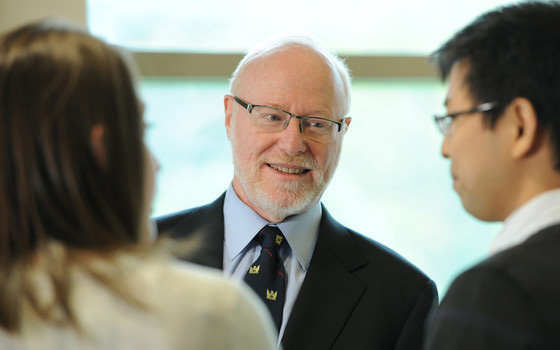
Along the way, as the university improved and its reputation grew, we seemed to attract more international students. At the beginning, this wasn‚Äôt a grand plan on our part, but over time we became more conscious of asking, ‚ÄėIf we‚Äôre going to get more international students, how do we shape the class that we want to have?‚Äô And the class we want to have is, on the one hand, focused on academic excellence, but also diversity.
We have over 100 countries represented at Ľ∆…ę÷Ī≤•, and though most of our students come from about 10 countries, having them come from 10 countries still offers more diversity than just one. I think that‚Äôs good intellectually, socially, and from of a business perspective; you don‚Äôt want to put all your eggs in one basket. That‚Äôs why, for example, we‚Äôve had a larger focus on Latin America as of late, because we think it‚Äôs a potential market for us and adds greater diversity to the existing student mix: more ideas, more experiences. And that‚Äôs great for all the students on campus.
What‚Äôs your perspective on Ľ∆…ę÷Ī≤•‚Äôs changing research profile over your time as president?
Again, there’s been an intensification: the amount of research funding in the country grew, and we captured a larger share of it. We went from around $30 million a year in external research income when I started to earning about $150 million this past year. That matters hugely. It generates the resources to bring in more graduate students, who are often a crucial part of the research enterprise. It finances more technicians and support staff to work in research. And obviously, as you build a more successful environment, you can recruit better and better professors who see good things happening here and want to be a part of it. We’ve gotten larger, more intense and more successful.
At the same time, we are a medium-sized university and we can’t do everything equally well, so we need to have some focus. Increasingly, that’s what government granting agencies are demanding: they want to see your depth in a particular area, to know who else from the university beyond the lead researcher is on the team. So over time, we’ve self-consciously built up some areas where we felt we were starting with a strong core, and as it turns out these areas were, in some circumstances, research areas the world wanted to invest in: health-care research, or oceans research, or science and engineering-based research. That is where government and industry, to some extent, are putting their resources.
It’s a matter of reading the trends, examining where our own strengths were, and building projects and institutional arrangements that would move us forward in a focused way. It’s not to say there isn’t room for people who are outside the major areas of focus; there’s lots of room for people to pursue their own interests in the university. But it is a reality that there are strong resources for some kinds of research and limited resources for others. To the extent that people wish to pursue their own careers in the context of the opportunities that are available, our challenge is to make sure that we have a supportive environment to allow those people who want to move in that direction to be successful.
Assessing success
You came to Dal as the Capital Ideas campaign was just getting underway. That campaign’s goal and result ($30M target, $80M raised) seems quaint compared to the just-completed Bold Ambitions campaign ($250M target, $280M raised). What does that say to you about how support for Dal has grown over the past 20 years?
Obviously, it’s a very positive story. I think, at some level, it reflects all these broader trends at the university. People like to be associated with success.
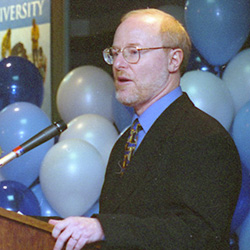 A significant portion of the gifts in the most recent campaign, like most universities‚Äô campaigns, came from a limited number of people. When people are making large gifts, the connection between the word ‚Äúgift‚ÄĚ and the word ‚Äúinvestment‚ÄĚ is not too far a stretch. People and organizations that have large sums of money have thought hard about where they want to spend it and what they‚Äôd like to achieve. So to the extent that we were able to build our reputation as a successful university ‚ÄĒ offering high-quality education, great research and full of really smart, capable people ‚ÄĒ that attracts donors who believe their gift will result in what they hope and dream for.
A significant portion of the gifts in the most recent campaign, like most universities‚Äô campaigns, came from a limited number of people. When people are making large gifts, the connection between the word ‚Äúgift‚ÄĚ and the word ‚Äúinvestment‚ÄĚ is not too far a stretch. People and organizations that have large sums of money have thought hard about where they want to spend it and what they‚Äôd like to achieve. So to the extent that we were able to build our reputation as a successful university ‚ÄĒ offering high-quality education, great research and full of really smart, capable people ‚ÄĒ that attracts donors who believe their gift will result in what they hope and dream for.
That makes for a nice, virtuous circle as well, since the success of the campaign then helps create the foundation for the next level of success of the university because we have more resources to do valuable things.
In your 1998 ‚Äúnew vision for change,‚ÄĚ you laid out that Ľ∆…ę÷Ī≤• should become ‚ÄúCanada‚Äôs most personal major university.‚ÄĚ Then in 2007, you set an even higher target: ‚ÄúCanada‚Äôs best university.‚ÄĚ As you leave office, what‚Äôs your take on Dal‚Äôs progress towards these goals?
It‚Äôs a nice question, because I haven‚Äôt actually compared the two phrases in some time. The first one, we now express as ‚ÄúCanada‚Äôs smallest big university.‚ÄĚ And I think that‚Äôs important, and goes back to one of the earlier questions you asked: the idea that we want this to be an environment in which people have an intense personal development opportunity, intellectually and socially. My own personal feeling is if you‚Äôre too small, you don‚Äôt have the resources to do all the things you want and should do for students, faculty and staff. However, if you‚Äôre too big, you lose the capacity to relate except through mass structures.
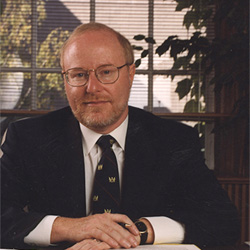 I think that personal element is essential to Ľ∆…ę÷Ī≤•, and as we have grown, we have been very self-conscious about the fact that we needed to put in place more supports, not less. I spoke about how we saw there was an imbalance in our budget: we were overspending on the formal academic side, and that meant we were underspending not just on infrastructure, but on the social dimensions and support side of the university. So as our funding grew, and our overall pot of funding got larger, we quite consciously devoted more resources to making sure the student experience would continue to improve. I think that‚Äôs actually a really important component of being ‚Äúthe best‚ÄĚ: you can‚Äôt be the best if you don‚Äôt have a great student experience.
I think that personal element is essential to Ľ∆…ę÷Ī≤•, and as we have grown, we have been very self-conscious about the fact that we needed to put in place more supports, not less. I spoke about how we saw there was an imbalance in our budget: we were overspending on the formal academic side, and that meant we were underspending not just on infrastructure, but on the social dimensions and support side of the university. So as our funding grew, and our overall pot of funding got larger, we quite consciously devoted more resources to making sure the student experience would continue to improve. I think that‚Äôs actually a really important component of being ‚Äúthe best‚ÄĚ: you can‚Äôt be the best if you don‚Äôt have a great student experience.
There are many elements to being ‚Äúthe best,‚ÄĚ and I will be the first person to say that there‚Äôs no way to define the terms. You could debate it till the cows come home and you‚Äôre not going to get a consensus, even from me. So, for me, the word ‚Äúbest‚ÄĚ was aspirational. I‚Äôve never been part of an experience where people want to be the ‚Äúsecond best.‚ÄĚ Even if you think there‚Äôs somebody who‚Äôs way better than you, you have to have an aspiration if you have any ambition, to push and work harder towards that goal.
But being ‚Äúthe best‚ÄĚ wasn‚Äôt ridiculous in the sense that when we looked at a handful of critical measures in key areas ‚ÄĒ in academics, student experience, research ‚ÄĒ we had a fantastic mix. There‚Äôs no index that‚Äôs going to say what the right balance of those areas is, but if we‚Äôre good across a large number of areas, it ensures we‚Äôre in the ‚Äúbig leagues,‚ÄĚ so to speak. And as long as you‚Äôre in the big leagues, you‚Äôre going to attract people who want to work in the big leagues, rather than the minor leagues. And on that front, we‚Äôve been successful: our growth in research grants, our greater percentage of students with 95% or higher entering averages ‚ÄĒ that says to me there are a large number of really capable people who want to be part of this major league team. That, to me, is part of being the best.
Will we ever win the league championship? I don’t know, because we don’t actually have a championship [for universities]. But I do know, at the risk of continuing this metaphor, that we’re in the right league, where we want to be.
Challenges and accomplishments
What have been some of the greatest challenges or obstacles in your presidency? If the goal is to be in those ‚Äúbig leagues,‚ÄĚ what have been the frustrations in getting there?
I think this goes back to the question of vision and change management. It‚Äôs very hard in a place filled with really talented, ambitious people ‚ÄĒ large numbers of them working in diverse fields ‚ÄĒ to have an absolute consensus on what it is that we should do. The cost of all that excellence is you‚Äôre going to have a lot of noise in the conversation, a lot of different points of view. And that‚Äôs a perfectly acceptable trade-off, from my point of view: I‚Äôd rather have a lot of smart people arguing about something than a lot of dull people following along. However, the challenge then is trying to help people move forward together.
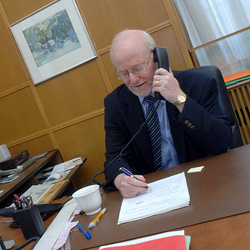 If I look back with any sense of frustration ‚ÄĒ and I think this is something that heads of large organizations in any sphere feel ‚ÄĒ it‚Äôs in working to integrate the differences of opinion, and how those differences are often a product of the differing views about the current situation. Some people look at the current situation very narrowly, or parochially, in terms of their own self-interest or some sub-group‚Äôs self-interest, and others have a larger view of the situation. That doesn‚Äôt meant the people with the larger view are necessarily right, but they are trying to take into account more factors. So you like to have discussions around complicated challenges with as many people who have that larger view as possible, so at least you‚Äôre discussing things from a common problem set.
If I look back with any sense of frustration ‚ÄĒ and I think this is something that heads of large organizations in any sphere feel ‚ÄĒ it‚Äôs in working to integrate the differences of opinion, and how those differences are often a product of the differing views about the current situation. Some people look at the current situation very narrowly, or parochially, in terms of their own self-interest or some sub-group‚Äôs self-interest, and others have a larger view of the situation. That doesn‚Äôt meant the people with the larger view are necessarily right, but they are trying to take into account more factors. So you like to have discussions around complicated challenges with as many people who have that larger view as possible, so at least you‚Äôre discussing things from a common problem set.
I have to own my part of this challenge, because when you fail to get everyone to the same place around a problem, that is a failure of communication: insufficient clarity in our messaging, insufficient inspiration in terms of our selling people not only on the character of the goal but the possibility of the goal. And when you don’t have people on board, you can try to force the institution along, but that is much more challenging than if you have, over time, substantial buy-in. So I’d say those struggles to achieve that buy-in were where my greatest frustrations occurred.
Are there any moments of your presidency that sum up the experience for you, that reinforce why the job was worthwhile?
There have been many moments; I couldn’t recount them all. But I’ve told this one story at alumni gatherings because it really struck me.
I was at an alumni event in Toronto that was very successful: more than 600 people came out to a place that attracted more young alumni than is typically the case. One young man came up to me, someone who had graduated within the past decade or so, and explained how his first year at Dal was a disaster. He had trouble connecting with people, was not doing well in his courses and was on a trajectory towards failing. One of his professors noticed his difficulty in writing tests and exams and suggested going to the counseling centre. He was assigned to a counselor who quickly diagnosed that he had a major anxiety disorder around writing exams. This counselor worked with him for the rest of the academic year on strategies to deal with this, and he not only made it through first year, he ultimately gained more confidence, graduated on the dean’s list and now is very successful back in Toronto. He even stays in touch with the counselor, occasionally sending notes to share how he’s doing.
This wouldn’t have happened if a professor didn’t care about the student, if the university didn’t have academic or administrative support staff that was able to step into a significant gap in this student’s life. I came away very moved by this, by how everything worked. This person was attracted to Dal because he thought it was a great school. He had a professor who actually saw this student as a person, not just as a grade or someone in the back of the classroom. The counseling centre had the right personnel, working on a human level, and the student flourished. That success story is, I believe, what every university should aim for.
Is there a particular accomplishment that stands out for you, personally?
When I arrived at Dal, we had a lot of problems that, in their aggregate, felt somewhat overwhelming to the community. I would come home after a day of listening to people’s concerns and I would share those insights with my wife, who’s a psychotherapist. Eventually, she told me that if I was describing a person rather than an institution, he or she would be diagnosed as clinically depressed. There was just so much negativity, despair and many questions about the future.
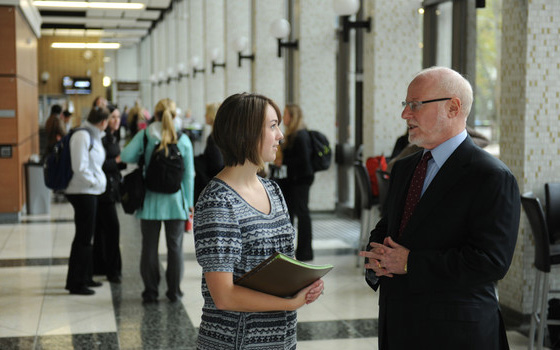
Over the years, it seems to me, our progress and the changes that come with success ‚ÄĒ new attitude, new faces on campus, new research ‚ÄĒ has moved us way past that situation to a real ‚Äúcan do‚ÄĚ environment on campus. People are more optimistic, more positive, more ambitious. The best university should be filled with people like that. So while that‚Äôs hard to quantify, if I have to say one thing I‚Äôm most proud of, it‚Äôs playing some part in helping move the culture of the place towards a greater sense of possibility.
Fond memories and new opportunities
What are you going to miss most about the job?
The people. It‚Äôs a tremendously collegial environment here. People at Ľ∆…ę÷Ī≤• are talented, they‚Äôre ambitious, they‚Äôre exciting, they‚Äôre stimulating, they‚Äôre committed to noble causes and they all work really hard for the good of the place. And that‚Äôs at every level of the organization: I‚Äôve met wonderful people who‚Äôve worked on faculty, on staff, in all different corners of the university. It‚Äôs always been an inspiration to know that we‚Äôre all in this together, that we‚Äôre all committed to do something that‚Äôs important for our society and our culture. To the extent that I step back from this job and move into other activites, I‚Äôll miss that sense of connectedness to those people, because it‚Äôs been a wonderful shared journey.
I won’t necessarily miss the relentless responsibility that comes with the sense of stewardship. There are more than 5,000 people who work at this university; if things go really badly, that affects a lot of people. I think I’ve worn all that responsibility well enough, but after 18 years, your shoulders get a little sore. It will be nice to pass it off to somebody else who looks like he has strong shoulders.
So what’s next for you, personally?
In the short term, I plan to retreat to the deck at the back of my house and read as many books that I have piled up as possible, get more exercise and enjoy the summer in ways I‚Äôve not been able to in a while. I don‚Äôt want to sound like I‚Äôm complaining ‚ÄĒ I‚Äôve lived a very happy life at Dal ‚ÄĒ but I‚Äôm looking forward to more space in my life where I can think in terms of days, weeks and months instead of hours.
And then, I’ll see. I’m still a professor at the university; I could easily return at the end of my administrative leave, and while I don’t know that I’d work full-time, I can imagine making some contributions as faculty. That’s a distinct possibility, but time will tell. People tell me I’ll be busier than I can imagine. I’ll wait and see what the wind blows in and see what to do next.
I joke sometimes that I’ve been in school since I was six years old. I’m going to be 65 at the end of June. Perhaps it’s time I left school and got a real job. (Laughs)
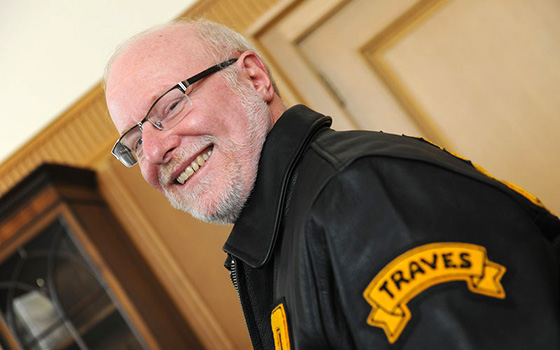
Read also:
Editor’s Note: This interview has been edited for length.

